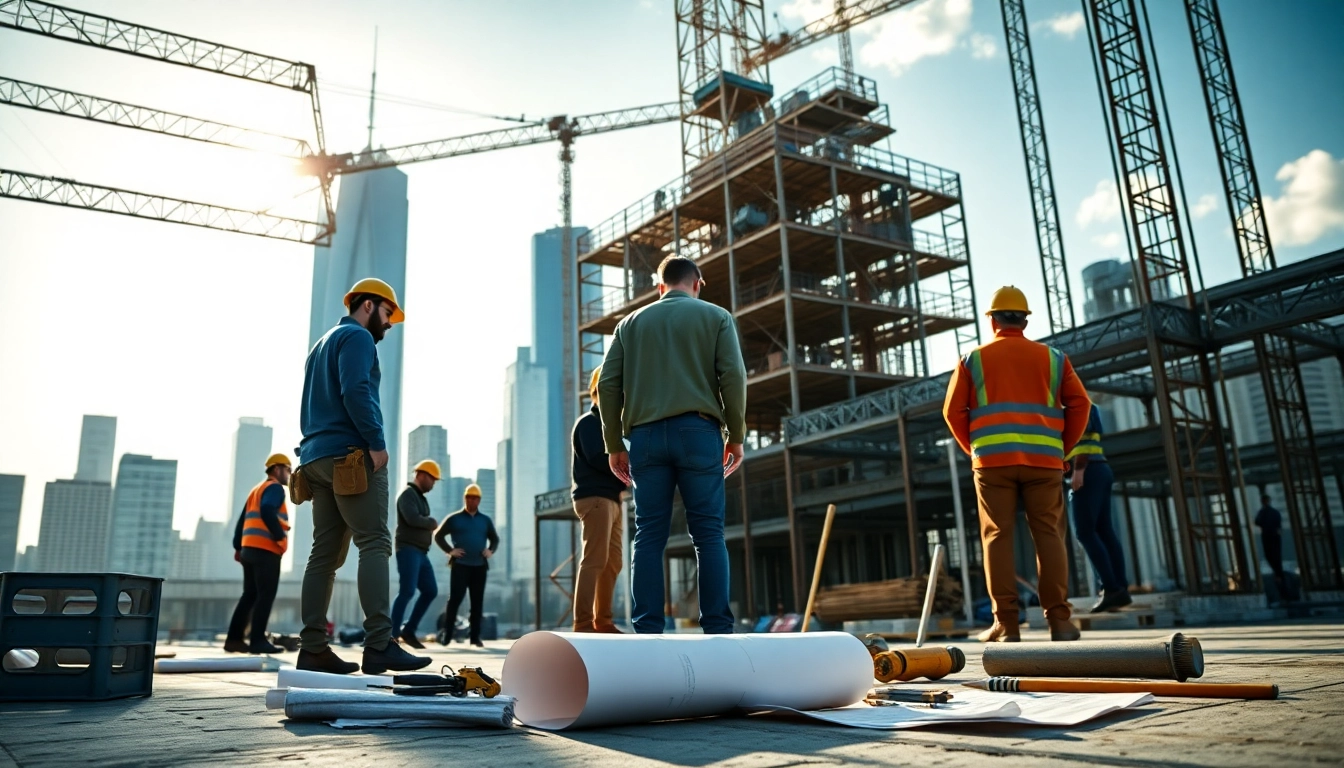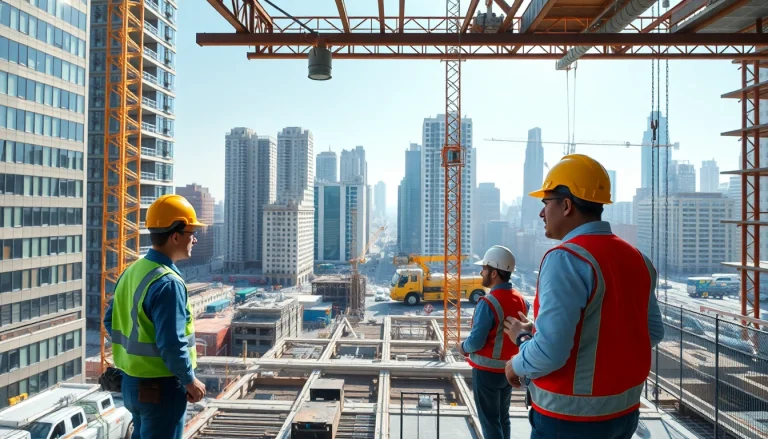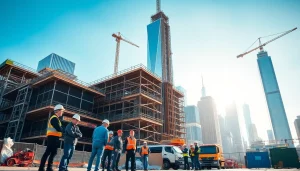Understanding the Role of a New York Commercial General Contractor
Definition and Importance in Construction Projects
A New York Commercial General Contractor plays a pivotal role in the construction industry, representing the primary link between clients and the intricate processes involved in building projects. They serve as the overseers of construction activities, managing various aspects of the project from conception to completion. Their expertise is integral in ensuring that the project adheres to the required standards, timelines, and budgets. With an environment as dynamic and complex as New York, the importance of a general contractor cannot be overstated, as they navigate the unique challenges and opportunities present in the urban landscape.
Key Responsibilities Explained
The responsibilities of a New York Commercial General Contractor are multifaceted and crucial for the smooth execution of any construction project. Here are some key responsibilities:
- Project Planning: A general contractor is responsible for crafting a detailed project plan that outlines the steps necessary to complete the project on time and within budget. This includes scheduling and resource allocation.
- Contract Management: They negotiate contracts with subcontractors and suppliers, ensuring that all parties understand their roles and responsibilities.
- Coordination of Materials and Labor: General contractors coordinate the provision of materials and labor to ensure that the construction process flows smoothly.
- Compliance and Permitting: They ensure that all necessary permits and inspections are acquired and adhere to local building codes and regulations.
- Quality Control: Ensuring that work completed is of high quality and meets industry standards is vital. Contractors enforce quality control measures throughout the construction phase.
- Communication: Maintaining clear communication with all stakeholders, including clients, subcontractors, and architects, is essential for soliciting feedback and addressing concerns promptly.
Types of Projects Handled by General Contractors
New York Commercial General Contractors handle a variety of projects that can range from small renovations to large-scale commercial buildings. Some notable categories include:
- Commercial Buildings: Offices, retail spaces, and mixed-use developments which require adherence to specific design and functionality standards.
- Industrial Construction: Factories, warehouses, and manufacturing plants with specific structural needs and operational requirements.
- Institutional Projects: Hospitals, schools, and government buildings that encompass regulations aimed at safety and accessibility.
- Residential Developments: Multi-family housing projects that require compliance with zoning laws and residential building codes.
Choosing the Right New York Commercial General Contractor
Factors to Consider When Hiring
Selecting a suitable New York Commercial General Contractor is crucial for the success of any construction project. Here are key factors to consider:
- Experience: Look for contractors who have extensive experience in similar projects. This gives assurance of their capability to handle specific needs.
- Reputation: Research the contractor’s reputation by looking for reviews, ratings, and feedback from previous clients to assess reliability.
- Location: Choosing a contractor familiar with the local area can provide advantages in knowledge of regulations and local supply chains.
- Communication Skills: Effective communication is fundamental in facilitating a collaborative atmosphere among all project stakeholders.
- Referrals: Ask for recommendations from peers or industry associates to get insights into trusted contractors.
Verifying Credentials and Experience
Credentials are a clear indicator of a contractor’s authority and competence. Here’s how to verify:
- Licensing: Ensure the contractor holds a valid license specific to the type of work being undertaken in New York.
- Insurance: Check that the contractor has appropriate insurance coverage, including liability insurance and workers’ compensation.
- Certifications: Various certifications can indicate specialized training or adherence to best practices within the construction industry.
Evaluating Previous Projects and Client Testimonials
Previous work creates a solid case for what can be expected in terms of performance. It is advisable to:
- Request a Portfolio: A comprehensive portfolio should showcase a range of completed projects that reflect versatility.
- Check References: Speak directly to past clients to gauge their satisfaction and communication experiences with the contractor.
- Site Visits: If possible, visit ongoing or completed construction projects to firsthand evaluate workmanship and site management.
Key Services Offered by New York Commercial General Contractors
Pre-Construction Planning and Budgeting
Pre-construction planning is essential to lay the groundwork for successful project execution. This phase typically includes:
- Feasibility Studies: Determining project viability based on location, budget, and design requirements.
- Detailed Cost Estimates: Providing accurate cost assessments helps clients understand budgetary needs upfront.
- Scheduling: Developing timelines for project phases to ensure the timely completion of tasks.
Project Management and Quality Control
During construction, effective project management ensures that every aspect is monitored and evaluated:
- On-Site Supervision: Continuous oversight of the construction site is vital for managing activities and resources.
- Progress Tracking: Regular updates on project status and adherence to the planned schedule keep all stakeholders informed.
- Quality Oversight: Continuous quality checks at different stages help in upholding standards and fulfilling client expectations.
Post-Construction Support and Maintenance
Even after construction, a reliable general contractor offers post-construction services to ensure lasting satisfaction:
- Final Inspection: A thorough examination of the completed work ensures everything is up to standards.
- Client Training: Providing the client with essential information about system operations and maintenance aids in long-term utility.
- Warranty Services: Offering warranties for work done as a commitment to quality assurance and customer satisfaction.
Challenges Faced by New York Commercial General Contractors
Managing Unexpected Project Complications
Construction projects are prone to unforeseen challenges such as adverse weather, labor shortages, or design changes. To mitigate these risks:
- Contingency Planning: Developing contingency plans for identified risks prepares contractors to manage complications effectively.
- Flexible Scheduling: Allowing buffer time in project timelines can accommodate delays without significantly impacting overall completion.
- Regular Communication: Keeping an open line of communication with clients and stakeholders allows for quicker resolution of emerging issues.
Navigating City Regulations and Permits
New York is known for its stringent building regulations and permit requirements. A competent contractor must:
- Be Well-Informed: Keeping abreast of local regulations and compliance requirements is crucial in ensuring a project proceeds without legal issues.
- Permit Management: Taking the lead on applying for and securing necessary permits reduces the risk of construction delays.
- Inspection Coordination: Collaborating with city inspectors supports maintaining standards throughout the construction process.
Adapting to Market Trends and Material Costs
The construction landscape is ever-evolving. Staying competitive requires contractors to:
- Monitor Market Trends: Understanding industry trends in design, materials, and sustainability helps in making informed decisions.
- Strengthening Supplier Relationships: Building strong relationships with suppliers can lead to better pricing and availability of materials.
- Lean Construction Practices: Adopt methodologies that reduce waste and optimize resources for enhanced efficiency and cost savings.
Future Trends for New York Commercial General Contractors
Incorporating Sustainable Practices in Construction
With increasing awareness about sustainability, New York Commercial General Contractors must adapt by:
- Green Building Certifications: Pursuing certifications such as LEED to promote environmentally-friendly building practices and appeal to eco-conscious clients.
- Material Innovations: Utilizing sustainable materials, including recycled or locally sourced options, to minimize environmental impact.
- Energy Efficiency: Implementing energy-efficient solutions during construction can lead to long-term savings and sustainable operational practices.
Embracing Technology and Innovation
Technology is transforming the construction landscape. Embracing innovation can lead to:
- Building Information Modeling (BIM): Utilizing BIM allows for enhanced collaboration through 3D model visualization, improving project accuracy and efficiency.
- Drones for Surveying: Employing drones in surveying provides precise mapping and assessments, reducing time and improving project planning.
- Construction Management Software: Implementing integrated software solutions streamlines project management processes and enhances communication across teams.
Anticipating Changes in Urban Development
As urban development undergoes significant transformations, general contractors must be proactive by:
- Understanding Demographic Shifts: Keeping informed about demographic changes allows for better market adjustments and demand forecasts in residential and commercial spaces.
- Addressing Affordable Housing Needs: Engaging in projects aimed at developing affordable housing can fulfill critical community needs while improving business viability.
- Collaborative Development Approaches: Partnering with local governments and community organizations helps address urban challenges through innovative construction projects.





